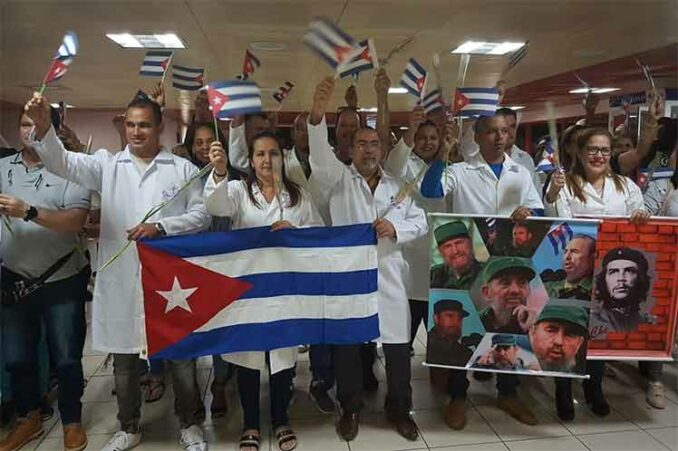Marco Rubio’s attempt to threaten Cuban health care falls flat

Cuba sends volunteer doctors to Italy to help battle the COVID-19 pandemic, 2020.
Secretary of State Marco Rubio began a diplomatic journey to the Caribbean on March 25 armed with a number of threats to countries he visited there. Rubio demanded that these countries reject services by Cuban medical teams or their diplomats would face the withdrawal of U.S. visas. Rubio justified his actions with bogus claims that Cuba is engaged in human trafficking and forced labor involving Cuban doctors working in other countries.
Washington thinks in terms of how much money socialist Cuba could lose, and the rejection of Cuban medical services could cost Cubans billions of U.S. dollars in revenue. Cuba’s medical system is one of the mainstays of its economy.
However, what the U.S. government doesn’t take into account is the power of international solidarity. Cuba has practiced this solidarity since 1960 when the socialist country sent doctors to Chile following a devastating earthquake. Cuba has never stopped sending medical teams to where they are needed, from sending medical personnel in 1963 to Algeria after that country’s revolution to now sending tens of thousands of health care workers to 165 different countries — offering anti-colonial health care to millions of people.
Cuba also provides free medical schooling to students who otherwise would not be able to afford it, including U.S. students for whom they maintain 10 openings each year.
Rubio was in for a shock when Jamaica’s Prime Minister Andrew Holness made it clear on March 26 that Jamaica has no intention of severing ties with a medical partnership it considers vital to its health care system. “Let us be clear, the Cuban doctors in Jamaica have been incredibly helpful to us,” Holness declared at a joint press conference with Rubio, according to Wired.
In addition, “Earlier this month, Antiguan Prime Minister Gaston Browne also sharply criticized the American position, warning that the absence of Cuban doctors would ‘literally dismantle our health care services and put our people at risk.’” (March 27)
In fact, nearly all of the Caribbean leaders vehemently rejected the U.S. administration’s allegations of forced labor and insisted they would prefer to give up their U.S. visas than jeopardize their public health systems’ cooperation with Cuba.
Guyanese President Irfaan Ali said, in advance of Rubio’s Caribbean trip, “I don’t see abandoning Cuba as part of this equation.” (Guyana Times, March 23)
Barbados Prime Minister Mia Mottley stated that her country couldn’t have gotten through the COVID-19 pandemic without Cuba’s doctors.
Prime Minister Ralph Gonsalves of St. Vincent and the Grenadines said, “I would prefer to lose my visa than have 60 poor and working people die,” in reference to hemodialysis patients treated under Cuban care. (Wired, March 11)
The U.S. government typically distances itself from the reality that human needs are more important and powerful than financial deals and threats of power. The denial of Rubio’s demands by multiple Caribbean countries represents another indication of a sea change in international relations.

